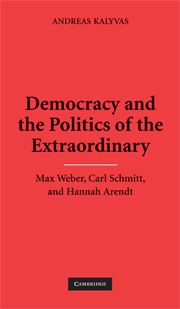Book contents
- Frontmatter
- Contents
- Acknowledgments
- List of Abbreviations
- Introduction: The Extraordinary and Political Theory
- I CHARISMATIC POLITICS AND THE SYMBOLIC FOUNDATIONS OF POWER
- II THE EXCEPTION AND CONSTITUTIONAL POLITICS
- 4 The Popular Constituent Sovereign and the Pure Theory of Democratic Legitimacy
- 5 Toward a Theory of Democratic Constitutionalism
- 6 The Extra-Institutional Sovereign
- III TAMING THE EXTRAORDINARY
- Conclusion: A Democratic Theory of the Extraordinary
- Bibliography
- Index
- References
5 - Toward a Theory of Democratic Constitutionalism
Published online by Cambridge University Press: 04 August 2010
- Frontmatter
- Contents
- Acknowledgments
- List of Abbreviations
- Introduction: The Extraordinary and Political Theory
- I CHARISMATIC POLITICS AND THE SYMBOLIC FOUNDATIONS OF POWER
- II THE EXCEPTION AND CONSTITUTIONAL POLITICS
- 4 The Popular Constituent Sovereign and the Pure Theory of Democratic Legitimacy
- 5 Toward a Theory of Democratic Constitutionalism
- 6 The Extra-Institutional Sovereign
- III TAMING THE EXTRAORDINARY
- Conclusion: A Democratic Theory of the Extraordinary
- Bibliography
- Index
- References
Summary
“Schmitt,” Stephen Holmes writes, “subscribed to the myth of a fundamental opposition between constitutional limitations and democratic government.…Schmitt's democratic mysticism, not to mention its practical consequences, suffices to discredit this entire approach. It is meaningless to speak about popular government apart from some sort of legal framework which enables the electorate to have a coherent will.” According to this line of interpretation, Schmitt sought to replace constitutionalism and a stable legal system with an immutable, boundless sovereign constituent power, often incarnated in a dictatorial president, ruling by arbitrary executive decrees and administrative orders. Schmitt's critique of the rule of law, the separation of powers, and of normative legal formalism, so this argument goes, is part of a broader, more ambitious attempt to abolish constitutionalism. Schmitt's appeal to a fictional constituent subject is seen as a pretext for the establishment of an executive dictatorship. Not only did he abhor liberalism; he also sought to undermine and destroy the idea of the constitution as government under law in order to replace it with a permanent state of exception and a normless emergency.
As I try to show in this chapter, these charges lose considerable force and cannot be consistently sustained once we take into consideration two crucial aspects of Schmitt's theory. The first is his stark, clear-cut distinction between the people in an extraconstitutional outside and the people within the constitution, or, to put it in more general terms, between the constituent people and the constituted people.
- Type
- Chapter
- Information
- Democracy and the Politics of the ExtraordinaryMax Weber, Carl Schmitt, and Hannah Arendt, pp. 127 - 162Publisher: Cambridge University PressPrint publication year: 2008

